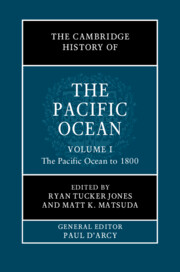Book contents
- The Cambridge History of the Pacific Ocean
- The Cambridge History of the Pacific Ocean
- The Cambridge History of the Pacific Ocean
- Copyright page
- Contents
- Figures
- Tables
- Contributors to Volume I
- Frontispiece
- General Editor’s Introduction
- Preface to Volume I
- Part I Rethinking the Pacific
- Part II Humans and the Natural World in the Pacific Ocean
- Part III Deep Time: Sources for the Ancient History of the Pacific
- 10 Biological Anthropology and Genetics in Pacific History
- 11 The Word as Artefact
- 12 Oral Traditions in Pacific History
- 13 The Evolution of Pacific Island Societies
- 14 Ancient Voyaging Capacity in the Pacific
- 15 Revitalizing ‘Traditional’ Navigation Systems in the Contemporary Pacific
- Part IV The Initial Colonization of the Pacific
- Part V The Evolution of Pacific Communities
- Part VI Europe’s Maritime Expansion into the Pacific
- References to Volume I
- Index
13 - The Evolution of Pacific Island Societies
from Part III - Deep Time: Sources for the Ancient History of the Pacific
Published online by Cambridge University Press: 11 November 2022
- The Cambridge History of the Pacific Ocean
- The Cambridge History of the Pacific Ocean
- The Cambridge History of the Pacific Ocean
- Copyright page
- Contents
- Figures
- Tables
- Contributors to Volume I
- Frontispiece
- General Editor’s Introduction
- Preface to Volume I
- Part I Rethinking the Pacific
- Part II Humans and the Natural World in the Pacific Ocean
- Part III Deep Time: Sources for the Ancient History of the Pacific
- 10 Biological Anthropology and Genetics in Pacific History
- 11 The Word as Artefact
- 12 Oral Traditions in Pacific History
- 13 The Evolution of Pacific Island Societies
- 14 Ancient Voyaging Capacity in the Pacific
- 15 Revitalizing ‘Traditional’ Navigation Systems in the Contemporary Pacific
- Part IV The Initial Colonization of the Pacific
- Part V The Evolution of Pacific Communities
- Part VI Europe’s Maritime Expansion into the Pacific
- References to Volume I
- Index
Summary
This chapter explores ways in which Pacific Island voices and ways of seeing history can be given more prominence in the long human history of the Pacific Islands. While focusing on my native Papua New Guinea (PNG) where most Pacific Islanders live, wider implications beyond PNG are drawn in the final section. I argue that a diverse assembly of local identities are central to Pacific identity, something which grand historical narratives seeking coherence and common themes sit uncomfortably with. PNG is the nation-state created from an imperial administrative fiction imposing an identity upon the eastern half of the island of New Guinea as a result of Western imperial competition. Pacific Island societies enacted their histories in oral traditions, social relations and social priorities, chants, songs, poems, art, and artefacts. Our ancestors settled the Pacific well over 50,000 years ago, so that much of our very early history cannot be articulated in detail through these Indigenous sources. However, this chapter argues that Indigenous forms of history can be employed far more than they have been to historicize the past in more locally comprehensible and contextual means. In particular, it is argued that the oral history research method is a legitimate way in which PNG’s past can be historicized. This entails creating and promoting a Papua New Guinean historiography in the form of audio and video recordings and a strict observation of other traditional forms and sources of history. It is important to promote a sense of history among Papua New Guineans and all Pacific Islanders that their historical movement is worth actively recording and is imperative for the future development of PNG and understanding itself within the global context. Diversity of identity is the human norm. The nation-state and national identity are relatively recent projects and larger amalgams that are generally only accomplished through coercion. However, the key to sustained common cause is seeing strength in diversity and recognizing that consent and recognized legitimacy are the only enduring means of sustainable association.
- Type
- Chapter
- Information
- The Cambridge History of the Pacific Ocean , pp. 296 - 322Publisher: Cambridge University PressPrint publication year: 2023



